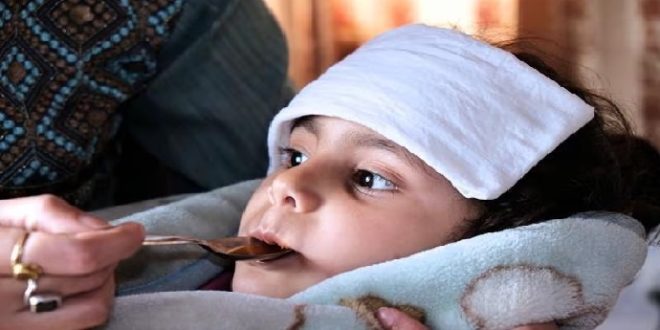23-12-2023
Bureau Report + Agencies
NEW DELHI/ MUMBAI: India’s drugs regulator has banned the use of an anti-cold drug combination in children aged below four and ordered that drugs should be labelled accordingly, in the wake of the deaths of at least 141 children globally linked to cough syrups.
 The regulator said concerns raised about promotion of an unapproved anti-cold drug formulation in infants prompted a discussion and a resulting recommendation to not use the combination for that age group.
The regulator said concerns raised about promotion of an unapproved anti-cold drug formulation in infants prompted a discussion and a resulting recommendation to not use the combination for that age group.
The order comes as India draws lessons from a spate of child deaths since 2019 that authorities linked to toxic cough syrups made in the country, including at least 141 deaths in Gambia, Uzbekistan and Cameroon since the middle of last year.
Within India, authorities said at least 12 children died and four others were left with severe disabilities in 2019 after consuming domestically-made cough syrups.
The deaths have cast a shadow over the quality of exports from India, often dubbed the “world’s pharmacy” due to its supply of life-saving drugs at low prices.
The order by the regulator on the fixed-drug combination (FDC), issued on Dec. 18 and made public on Wednesday, requires drugmakers to label their products with the warning that the “FDC should not be used in children below 4 years of age”.
The fixed drug combination comprises chlorpheniramine maleate and phenylephrine medication that is often used in syrups or tablets to treat common cold symptoms.
 The World Health Organization does not recommend the use of over-the-counter cough syrups or medicines for the treatment of coughs and cold symptoms in children younger than five years of age.
The World Health Organization does not recommend the use of over-the-counter cough syrups or medicines for the treatment of coughs and cold symptoms in children younger than five years of age.
India has introduced mandatory testing for cough syrup exports since June and stepped up scrutiny of drugmakers. Drugmakers whose cough syrups were linked to child deaths have denied any wrong doing.
India’s drugs regulator has ordered that the source and quality of an ingredient used to make cough syrups be checked and verified as a “top priority”, in the wake of the deaths of at least 141 children globally.
In one of the world’s worst such waves of poisoning, cough syrups made by three Indian manufacturers have been linked to the deaths of dozens of children in Gambia, Uzbekistan and Cameroon since the middle of last year.
The drug makers have denied allegations that their products were responsible for the deaths, which have cast a shadow over the quality of exports from India, often dubbed the “world’s pharmacy” due to its supply of life-saving drugs at low prices.
In a letter this week, India’s Drug Controller General Rajeev Singh Raghuvanshi directed state and regional authorities to carry out inspections and verify the source and quality of propylene glycol (PG) either produced domestically or imported by cough syrup makers.
He also directed drugs inspectors to submit a supply chain verification report for PG manufacturers and importers
The direction was issued to rule out “possible quality issues” related to toxins diethylene glycol (DEG) and ethylene glycol (EG) in cough syrups and the diversion of industrial grade PG, Raghuvanshi said in a letter dated Dec. 6 and seen by media.
 Pressmediaofindia
Pressmediaofindia




